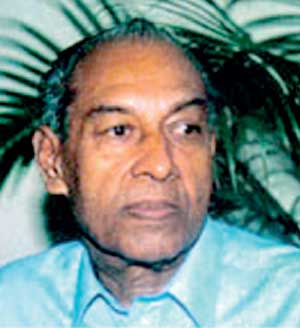Reply To:
Name - Reply Comment
By Mahinda Jayaweera
A Civil Servant of great repute both national and international, an award winning writer, a veteran literary critic, a professional social service administrator, a great lover of art, music and drama and a thorough gentleman - all this is Dr. Leel Gunasekara.
A rare combination of charm, dignity and versatility, Leel Gunasekara in his eighties is agile, energetic, cheerful and young at heart.
In mass media, so much has been talked of and written about Leel Gunasekara that it is difficult for one to write about him without repeating what eminent  scholars have already discussed. However, in my humble way let me write here how I see him and what I feel about him.
scholars have already discussed. However, in my humble way let me write here how I see him and what I feel about him.
In the mid-twentieth century, the country was governed by nine Civil Servants who held office as Government Agents of the nine provinces. During those days Leel Gunasekara’s seat of authority was Anuradhapura, the capital of the North Central province, better known as Rajarata. This young administrator, youthful and handsome, was on circuit, driving his vehicle down the bund of Kalawewa when he saw a charming village lass in her bathing clothes dipping in the blue waters of the tank all alone. The stimulus naturally stirred the romantic pulses of the youth. The refined poet in him overpowered the natural impulse, and the final outcome is this fine piece of verse.
He managed to control his emotions, finding refuge in his inborn talent, the poetry which displayed the quality and calibre of his character too.
Though he has never been rich in life, all that he needed for a simple yet comfortable life has been at his reach. Extravagance has never been his way of life. During his long tenure of office he has been above board, having his hands clean. He set an example to the generations that followed.
A sage had once said,
“The best portion of a Good Man’s Life, His little unremembered Acts, Of Kindness and of Love”.
This is very true in Leel Gunasekara’s life. Dr. Leel Gunasekara belongs to the new breed of Civil Servants who were responsible for bringing about a distinct change of the Civil Service culture, which took place in the late fifties and early sixties. The old brigade of the Ceylon Civil Service, as the saying goes, walked with kings, but had lost the common touch.
.jpg) entry point watched by a supra peon in uniform, called Arachchi.
entry point watched by a supra peon in uniform, called Arachchi.